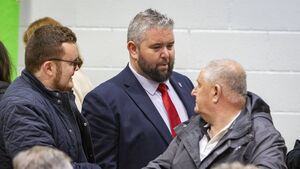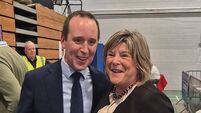Waterford bucked national trends at the polls

Conor McGuinness at the Waterford count centre in SETU. Photo by Joe Evans.
The iconic former Senior Minister Martin Cullen characterised the General Election results in Waterford as a “vote for the Government”, with the Déise returning TDs from both major ruling parties.
However, Waterford was actually less supportive of the Government parties compared to the national picture.
The biggest difference between Waterford and the national picture is the outpouring of support for the third-biggest party in the country – polling at just 19 per cent of the first preference vote, Sinn Féin swept 33 per cent of the first preference vote to secure the Déise Double.
Going into polling weekend, the general consensus from the public and most of the political candidates was that Waterford had been left behind by the current government – unsurprisingly Fine Gael and Fianna Fáil Deputies Cummins and Butler did not concur.
Sinn Féin even had election posters making that point littered across the county, it is always easier for the presumptive opposition to make promises on their manifesto, which doesn’t include the word Waterford once, surely isn’t the reason for Sinn Féin’s strong support.
History doesn’t explain their performance; the first Sinn Féin TD to be elected in the constituency was David Cullinane in 2016. Is it just the strength of the Cullinane vote?
Cullinane has run in every General Election race since 2002 and has built up a strength of loyal support in the county which grew to nearly unbelievable heights in 2020 with 38.3 per cent of the vote.
The 5.25 per cent drop in Sinn Féin support this year is actually a huge overperformance compared to the national vote in which the party is polling at just 19 per cent.
The reason to Sinn Féin’s superlative form in the Déise is due to candidate choice and campaign management – give Cullinane’s campaign chief Michael Doyle a raise! Newly-elected TD Conor McGuinness certainly has a lot to thank his senior colleague for in the results, but significant credit needs to be given to him for raising his own profile in west Waterford and Dungarvan. McGuinness, the only significant candidate based west of Portlaw, comfortably topped the poll in his homelands.
For the Government parties, allowing Sinn Féin to win two seats by only running one candidate each will certainly be a source of some chagrin but, contrary to popular belief, the results make any other strategy look extremely risky. Better to comfortably win one seat than risk it for two.
Of Fianna Fáil candidate Mary Butler’s 9,894 first preference votes, nearly two-thirds came from Portlaw and the west of the county. Deputy John Cummins was noted prior to the election for his efforts in the west, a ploy which paid off handsomely with nearly half his 10,203 votes coming from the west.

Running a blocking candidate would have been extremely risky, Fine Gael and Fianna Fáil played the best hands available to them.
Support for the two Government parties in Waterford was down 1.5 per cent and 3.1 per cent respectively, compared to the national average. Both candidates were strong and well-known and had impressive ground teams and significant financial resources at their campaign’s disposal.
Naturally, with any average there must, mathematically, be underperformers but the fact that these two candidates – with their stature and name recognition - posted the relative underperformances points to a relative maximisation of the voter base available to the Government parties.
Other than Deputy Cullinane, all of the candidates were elected on the most unreliable of factors, transfers.
Throughout the weekend, on the count floor, in the media room and in campaign group chats there was widespread surprise at the way preferences were being transferred.
Perhaps it was the joint-record number of candidates running in the constituency or the presence of four relatively unknown independent candidates, but there was a shocking number of transfers to and from candidates who would be diametrically opposed on policy. Aontu’s Dr Ronan Cleary and Mary Roche of the Social Democrats are the most unlikely political alternatives, yet 254 people disagreed on the 10th count.
It was transfers that ultimately decided the final seat in the constituency, McGuinness began the race with a 436-vote lead which stretched out to 1,373 votes in the 6th count. Matt Shanahan clawed back a chance going into the final round by bringing the delta down to just 639 votes but, despite coopting each other onto council positions in the past, Shanahan benefitted far less from Councillor Mary Roche’s transfers than would be expected.
Of the 4,887 votes Roche had accrued by the time of her elimination from the count, Shanahan received fewer than his Sinn Féin opponent, but the most crucial decider was the number of untransferable votes as we went further into the count.
The cumulative number of untransferable votes was greater than all but one candidate’s transfers, 3,313 votes ran out of preferences during the count – a sum only Conor McGuinness’ 3,728 transfers could beat. In the final round, 1,853 votes were unable to be transferred, a number which could have changed the outcome of the election.
Sinn Féin’s Déise double was made out of a smart strategy with two strong candidates allied to favourable transfers, and completely bucks the trend of the national vote.






